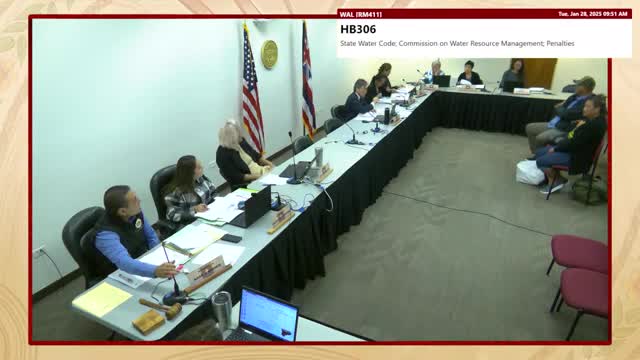House panel hears sharp concerns about proposed jump in water-code penalties
January 25, 2025 | House Committee on Water & Land, House of Representatives, Legislative , Hawaii
This article was created by AI summarizing key points discussed. AI makes mistakes, so for full details and context, please refer to the video of the full meeting. Please report any errors so we can fix them. Report an error »

The House Committee on Water and Land on Jan. 28 debated a bill to raise civil penalties for violations of the State Water Code, with witnesses and committee members warning the bill’s proposed range could unfairly burden small landowners and trap enforcement agencies in ambiguity.
The Department of Land and Natural Resources (DLNR) told the committee it needs stronger penalties as tools to deter serious water-code violations. “It's $5,000 per violation” under current law, Ryan Kanakawole of DLNR said, adding the agency supports giving the commission more enforcement capacity but acknowledged questions about the proposed maximums and language for continuing violations.
The Honolulu Board of Water Supply opposed the bill as drafted, citing the effect on ratepayers and small users. Ernie Lau, manager and chief engineer for the Board of Water Supply, said the proposed maximums are “a little harsh” and urged the committee to consider the administration’s alternative (House Bill 1142) that phases increases over time and requires adoption of administrative rules to guide enforcement decisions.
Public testimony included strongly worded concerns from community members and farmers who warned that a very large penalty range could be applied to routine or accidental infractions. Committee members flagged a potential drafting problem: the statutory text calls each day a separate “offense” while later language refers to “continuing violations,” creating legal uncertainty about whether an enforcement action could multiply into multiple maximum-range penalties.
DLNR said it uses an internal penalty policy that considers gravity and mitigation and that past penalties have ranged from small fines to larger settlements depending on severity and context; the agency offered to provide the committee with its penalty history and internal policy for review.
After discussion, the committee directed staff to revise the language, align the measure with the administration’s approach (HB 1142) and add requirements for administrative rules and public input. The committee moved the bill forward with technical edits that narrow the immediate change (the committee replaces the extreme top-end penalty with a staged approach and asks for rule-making to guide use of penalties).
The Department of Land and Natural Resources (DLNR) told the committee it needs stronger penalties as tools to deter serious water-code violations. “It's $5,000 per violation” under current law, Ryan Kanakawole of DLNR said, adding the agency supports giving the commission more enforcement capacity but acknowledged questions about the proposed maximums and language for continuing violations.
The Honolulu Board of Water Supply opposed the bill as drafted, citing the effect on ratepayers and small users. Ernie Lau, manager and chief engineer for the Board of Water Supply, said the proposed maximums are “a little harsh” and urged the committee to consider the administration’s alternative (House Bill 1142) that phases increases over time and requires adoption of administrative rules to guide enforcement decisions.
Public testimony included strongly worded concerns from community members and farmers who warned that a very large penalty range could be applied to routine or accidental infractions. Committee members flagged a potential drafting problem: the statutory text calls each day a separate “offense” while later language refers to “continuing violations,” creating legal uncertainty about whether an enforcement action could multiply into multiple maximum-range penalties.
DLNR said it uses an internal penalty policy that considers gravity and mitigation and that past penalties have ranged from small fines to larger settlements depending on severity and context; the agency offered to provide the committee with its penalty history and internal policy for review.
After discussion, the committee directed staff to revise the language, align the measure with the administration’s approach (HB 1142) and add requirements for administrative rules and public input. The committee moved the bill forward with technical edits that narrow the immediate change (the committee replaces the extreme top-end penalty with a staged approach and asks for rule-making to guide use of penalties).
Don't Miss a Word: See the Full Meeting!
Go beyond summaries. Unlock every video, transcript, and key insight with a Founder Membership.
✓
Get instant access to full meeting videos
✓
Search and clip any phrase from complete transcripts
✓
Receive AI-powered summaries & custom alerts
✓
Enjoy lifetime, unrestricted access to government data
30-day money-back guarantee

